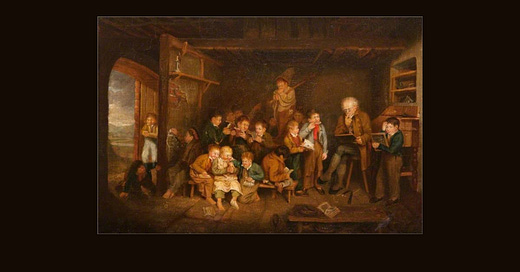Lesley Riddoch's effort to polish the turd of the decade since the 2014 'independence' referendum is as valiant as one would expect from such a fine writer and tireless champion of Scotland's cause. But if she can be said to have answered the question of what we have to show for those ten years, it is only in an unsatisfyingly vague and tenuous manner. What we have gained, according to Lesley, is 'connection'. Connection among ourselves and/or connection to Scotland.
Are you excited yet? Nor I!
To whatever extent that it is the case that we have become more connected, it is far from clear how this furthers Scotland's cause - directly or indirectly. And I am far from convinced that the new connectedness that Lesley perceives is real. If it were, we'd face some difficulty explaining the fragmentation of the independence movement and the acrimonious tribalism of the various factions. A less rosy view of the independence movement reveals only disconnection. Disconnection from other parts of the movement. Disconnection from the struggle to restore Scotland's independence. Disconnection from the democratic process.
Perhaps Lesley chose the word 'connection' because the term 'combination' would have been too obviously at odds with observable reality.
The reaction across the independence movement to the launch of New Scotland Party is illuminating. Broadly speaking, that reaction falls into three categories. There has been a great deal of genuine interest and support from many who would class themselves as belonging to the grassroots of the independence movement. There has been a roughly equal amount of vitriolic condemnation from the same quarter. The difference between them being that whereas the former have made an effort to find out what New Scotland Party stands for, the latter find no need to inform themselves.
The third category is the mainstream media and the political elite, who have either been unaware of what's happening or have make a superlative job of pretending obliviousness. What connects (this will please Lesley) the second and third category is the idea that all that is of any consequence happens inside the bubble formed around senior politicians and the media 'personalities' with whom they have a symbiotic (mutually parasitic) relationship.
What distinguishes the first category - lest you have forgotten, that's the people taking a sympathetic interest in a fresh development in the independence movement - is that they are the people who have learned the lessons of the 2014 referendum and its ten-year aftermath.
There is a moment when Lesley seems about to recognise something very significant.
We have marched a lot, strategised a lot, educated ourselves enormously about alternative structures and better functioning countries and systems, particularly our neighbours – revitalised Ireland and the hugely successful Nordic nations.
My heart lifted momentarily at the words "educated ourselves". Only to sink again when it turned out that Lesley was referring to the notion that Scotland's cause might be progressed by jealously regarding the best of other countries and promising a Scotland which is all that. This is a variation on selling independence like a holiday destination. A strategy which has been enthusiastically preferred and half-heartedly pursued by the denizens of the aforementioned bubble. A strategy which has produced results that would be flattered by the term 'lacklustre'.
There is a large and growing section of the independence movement which has educated itself in much more meaningful ways since 2014. This is what Alf Baird has called the "intellectual wing of the independence movement". The people who have researched and studied and pondered every aspect of Scotland's constitutional predicament, along with those who have attended to this 'new thinking' as it has developed.
I'm talking about the people who have realised for themselves or learned from others that the 2014 referendum wasn't a real constitutional referendum and would not have led to independence even had Yes won. People who now recognise that there is no route to the restoration of Scotland's independence through the legal and constitutional framework which developed under the imperative to preserve the Union at any cost.
People who have realised that the existing nominally pro-independence parties had been captured by the British political system and thus rendered useless to Scotland's cause.
People whose most significant connection is to the harsh reality of where things stand with the constitutional issue. Not in a good place!
What we have a decade after the sham independence referendum is a growing awareness that the 'joyfully positive' phase of Scotland's liberation struggle is past. We have increasing acceptance that Scotland's cause demands a new and more assertive approach.
What we have, at least among the more attentive part of the independence movement, is a growing realisation that Scotland's cause requires less compliance and more defiance. We have the awakening of a new spirit of determination that is not merely a damp revival of the happy-clappy 'spirit of 2014' with its naive belief in consensus and misplaced faith in British demockracy, but an entirely different mindset.
The ten years since the 2014 referendum have given us time to decolonise our minds. Not everyone in the independence movement has made good use of this time.




